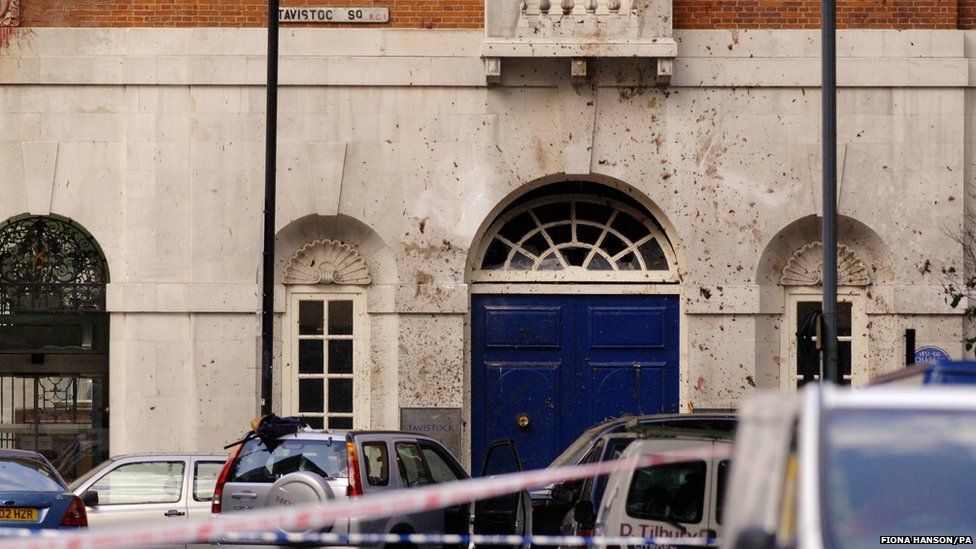'In a day of awfulness, we were lucky to do some good'
- Published

Ten years ago today, doctors congregating at the British Medical Association's headquarters in central London could not have predicted how important their medical skills and knowledge would be, as a suicide bomber exploded his device on a bus passing their building in Tavistock Square.
Fifteen doctors meeting inside an upstairs room of their profession's headquarters felt the 100-year-old building shake and heard the unmistakable blast of a bomb.
Three bombs had already gone off in separate incidents on London Underground creating chaos in the capital's transport system. As a result, commuters were turning to buses to reach their destinations.
The number 30 bus had been re-routed to avoid the affected areas, and it was travelling past BMA House, the headquarters of the British Medical Association, when it exploded, ripping the roof off from front to back.
Read more - 7 July attacks
One doctor later said everything went "a salmon pink colour" before they dropped everything, ran down the stairs and out into the square.
What greeted them was an eerie stillness. Sirens could be heard in the background, pigeons were cooing - and there were casualties and fatalities everywhere.
Their first priority was to cover the dead and then help the seriously injured passengers off the bus because of the fear of another secondary device being detonated.
But they had little or no medical equipment. BMA House was an office and conference building - not a hospital.
So in the first 10 or 15 minutes after the explosion, the building was raided for any useful medical supplies.
The cafe's tables became makeshift stretchers and the canteen's tablecloths were used as bandages to stop the bleeding.
GPs normally accustomed to talking to their patients in a consulting room tended to bleeding men and women lying on the street, holding their hands, urging them to hang on.
Surgeons used to working in spotless operating theatres found themselves kneeling amid the dust, glass and debris of a war zone.
The abiding memory of that morning for Dr Andrew Dearden, a GP from Cardiff, was the slow realisation that this was not a normal trauma event.
He heard the "whoosh" of the bomb, turned round and expected to see a collision.
But as he walked towards the bus, he noticed a wide circle of debris, then a purse lying in the street and closer in a severed limb.
"The closer I got, the more I saw. Although my brain had worked out what had happened, I was confronted with evidence of the real human cost."
The doctors, 18 in total, began to congregate and organise themselves, prioritising the people they could help, comforting the ones they could not.
Dr Peter Holden, a GP from Derbyshire trained in immediate emergency care, took command of his fellow doctors, using his training to set up a treatment centre within the secure courtyard of the BMA building.
"My job was to do the most for the most, secure the scene and prevent chaos."
Armed with only a pair of surgical gloves, a face mask and four first aid kids, he said it was about giving "top notch, simple first aid" for the first 30 minutes or so until the drips and oxygen arrived on ambulances coming to take the injured away.
They had to focus on what resources they had and use them on the people who needed them most in the right order.
With no mobile reception that morning, Dr Holden and his team sent messages via returning ambulances, requesting medical supplies.
Both doctors believe there is no doubt that lives were saved that day because they treated people quickly.
Looking back, Dr Dearden says, "in a day of awfulness, we were lucky to be able do some good".
There were many other people who played an important role too in supporting the doctors' efforts - BMA staff, local hotels, paramedics and passers-by.
Some doctors were hit harder than others by what they saw. Many felt guilty about leaving the scene once everyone had be taken to hospital several hours later.
But a decade on, the series of coincidences that saw a bus explode outside a building full of doctors, is still not lost on them.
Yet this anniversary is not about them, they say.
"It is about the people who were injured and killed that day," says Dr Dearden.
In the garden of the BMA building, within its secure walls, is a sun dial erected in memory of the 13 people who were killed.
It casts a shadow every day at 9.47am - the time the bomb exploded - as a constant reminder of that devastating moment.